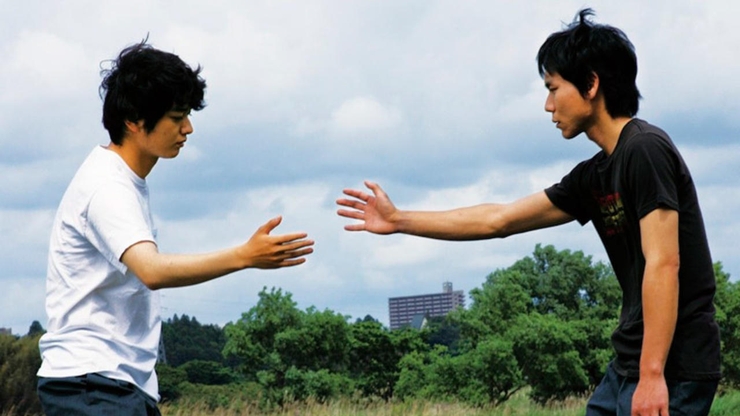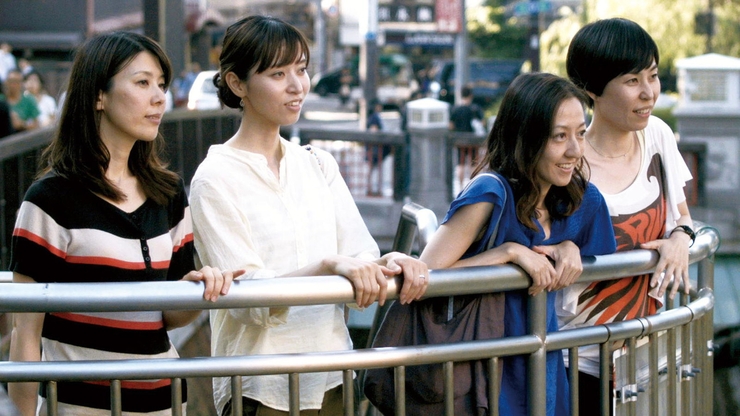Domains – The Rules of the Game Without Rules
For some time, MUBI is offering its subscribers a new section of recent films which investigate the lesser-beaten paths of cinema. Be it lyrical-anthropological documentaries (such as the delightful Djamilia and L’héroïque lande), or dramas about protagonists hailing from peripheral areas of society (such as the brazilian feature Arábia), Explorations is an ever-expanding collection of increasingly daring titles. Its latest entry is the Japanese film Domains, an experiment which plays upon the spectator’s perception and the mechanisms of cinema.
What must be said from the get-go is that Domains (Natsuka Kusano, 2019) is an experience that verges on the limits of cinema, as well as those of a performance that lies beyond the screen. A true story that could have served as an inspiration to a bland drama is briefly outlined at the very beginning, in a moment that could very well act as a prologue: in a summarily-decorated chamber, a prosecutor reads out the confession of a woman who killed a child to the woman herself. The two of them are sitting opposite each other at a plain table, surrounded by white walls and a window that reveals the branches of a tree. The man’s tone is neutral, and the act of reading the document does not elicit any special reactions from either of the two.

However, at the end of this prologue, a first epiphany takes place, one that is albeit improbable in this whole rigid situation: Aki (Shibuya Asami) attributes the killing to some sort of vague force, „something like time”. Her words extend beyond this moment, appearing recurrently in a song that is repeatedly hummed, a mystical password of sorts that enables one to enter the territory of a childish game that is remembered as the plot moves on. This is how we arrive at Nodoka (Kasajima Tomo), Aki’s childhood friend and mother of the slain child. Later on, the film will reenact the meetings between the two women (and, at one point, the husband of Nodoka emerges as well), some episodes that take place before the crime, set within a summary mise-en-scene: the story is built upon recorded rehearsals which are successively put together, like a snowball that rolls down and keeps on expanding.
Here, the meta-cinematic play seems to have its roots in the Brechtian methods of some already-seminal directors (Jean-Marie Straub and Danielle Huillet are the main reference, most probably), but the means are refreshed and adapted to a new context. What is seen sets the spectator in a dilemma, even though the acting seems natural, while the lines and reactions of the characters are credible, as these lines of dialogue, naturalistic as they are, are read and re-read from a series of pages (which, one might guess, are part of a script). The distancing effect that is at play here isn’t a result of a neutral and nuance-less acting, like in the films of Straub and Huillet, but rather one that stems from the opacity of the process of preparing the acting and staging, from the fact that the director is seemingly offering us the recipe of the film itself, a sort of making-of of a making-of film. An effect that, as a matter of fact, is also underlined in the film’s formality: the rehearsal of a „shot” is accompanied by the camera trying on a different shooting angle, a different composition and of various movements, as if the director of photography would permanently test out the possibilities of the camera, even during the shooting itself. It’s precisely this ambiguous approach that situates Domains somewhere in the middle of similar experiments from the past years, such as Ruth Beckermann’s recent feature, The Dreamed Ones / Die Geträumten (2016) and Eternal Homecoming/ Vechnoe vozvrashchenie (2012), Kira Muratova’s last film.

If Beckermann’s film paints the picture of a relationship that spans twenty years by means of reading out the two lovers’ (poets Paul Celan and Ingeborg Bachmann) correspondence, the Japanese director’s cinematic discourse is also centered around the act of reading, which is however set in a different register. The love story which is narrated in The Dreamed Ones is the topic of the film itself, but it isn’t reconstructed either by means of mise-en-scene, nor by acting. The discourse is essential in both cases, while the main interests (at least, up until a certain point) are the stories themselves: the tumultuous love story between the two poets, in the first, and the aberrant, shocking crime, in the second. While Ruth Beckermann chooses a recording studio, Natsuka Kusano places her characters in an unpretentious setting, a series of modern and anonymous chambers, where the story is read and acted out – over and over again – by actors wearing slippers. And just as the stories in Eternal Homecoming are repeated in a loop several times, Domains also resumes the same fragments of texts, while slightly changing the setting, changing the composition and the character in focus (while, in contrast to Muratova’s film, the actors remain the same throughout). Kira Muratova was interested in the versatility of cinema and of its self-reflexive possibilities, by the mechanisms that surprise the spectator once they are revealed; her film is meta simply through the fact that, at the end of the film, we realize that what we had seen were the casting tryouts of a series of actors, which were shot not for the spectators-within-the-cinema (or, rather, only on a secondary plane), but for some spectators-within-the-film: a producer and a possible sponsor of the film. In a similar fashion, the rehearsals in Domains no longer seem to be shot for external spectatorship, but rather for the team itself, which is preparing this intriguing film (while, une fois de plus, the illusion is broken apart by the clapper board and the voice of the director, which is heard from somewhere off-screen).
Sure enough, the risk of such an endeavour is to get swamped within a perpetuous monotony – both formal, as well as in terms of dialogue or the progression of the narrative – which could make the film lose many spectators throughout its run. But one of the main parlays that the director wins is the very lucidity with which she rewrites the rules of classical narration, how she offers herself various waivers from the filmic genre and leads her film to a vague area, without chipping away at its evocative powers. In the end, Natsuka Kusano reins in the fact that she is testing the viewer’s endurance, and it might just be that this is where the film’s charm resides, in our incapacity to figure out if we are watching a documentary, a drama or a thriller.
Title
Domains
Director/ Screenwriter
Natsuka Kusano
Actors
Tomomitsu Adachi, Tomo Kasajima, Ryu Kenta |
Country
Japan
Year
2019
Distributor
Mubi
Student at the National University of Film and Theatre and from time to time, film critic. Also in charge with the preselection process for One World Romania. She writes articles for Film Menu magazine and Acoperișul de sticlă.Student at the National University of Film and Theatre and from time to time, film critic & soon she will finish her Bachelor's degree with a study about Alexandru Tatos.
